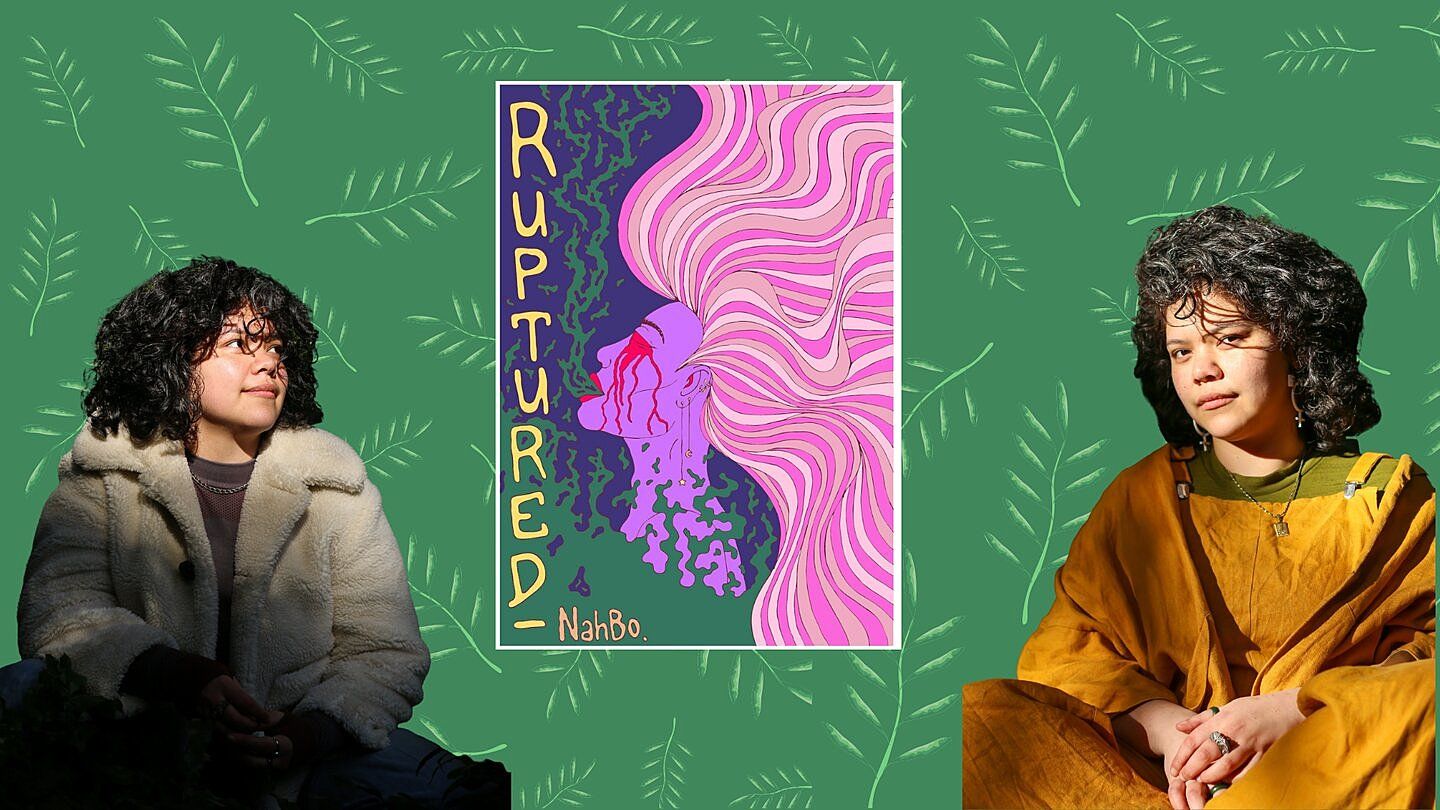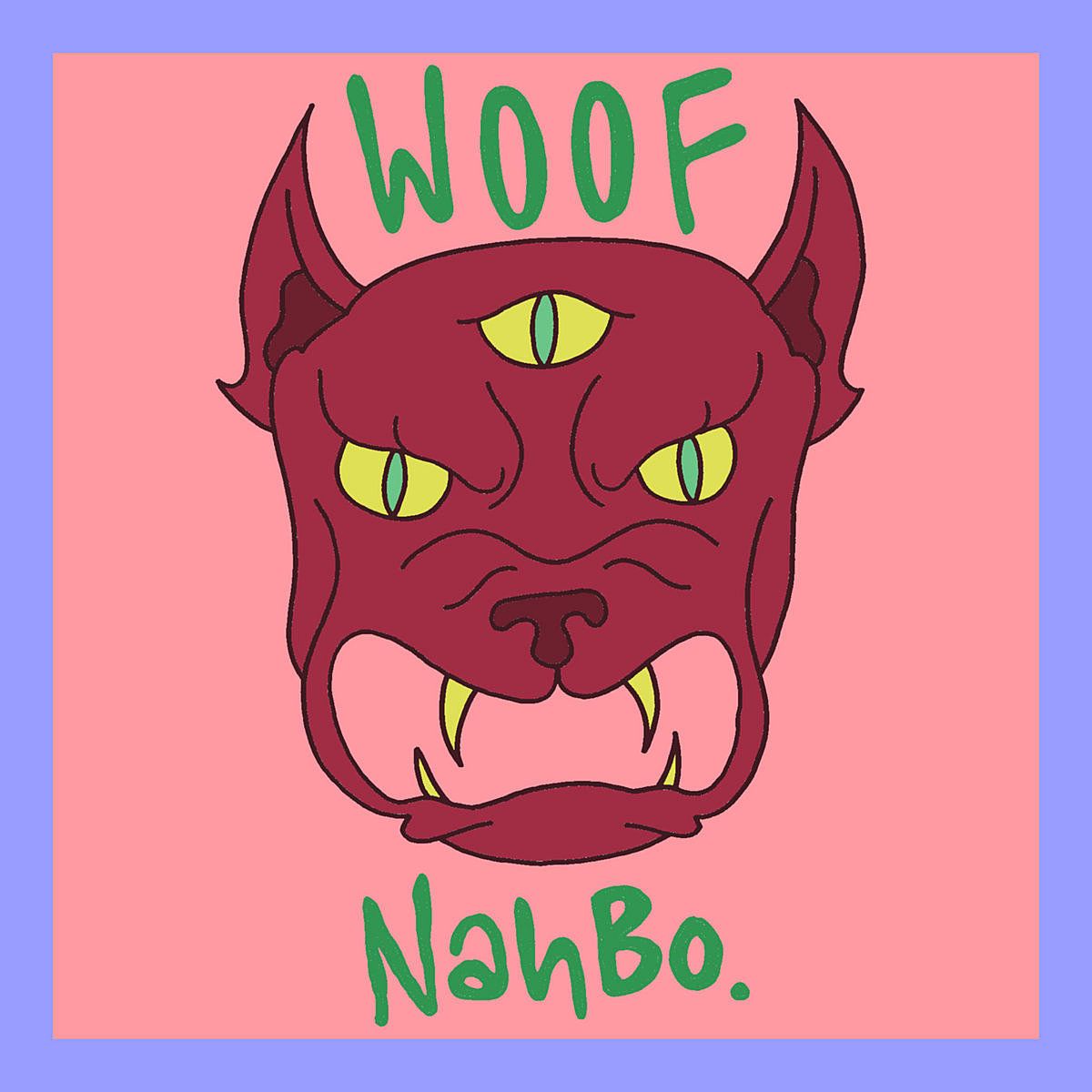Astronesian Futurisms
Kahu Kutia in wānanga with Nahbo on their debut album Ruptured, the newest drop from Empty Goon Records.
In my own experience, the most profound and generative conversations about art and music and all that other stuff happen amongst friends, people who share mutual life experiences, or in spaces where the seeds of relationship have been planted. Whakawhanaungatanga is a tool that can guide us on a journey into the work, bringing all of our intersectionalities and nuances.
My dear friend Nahbo released their debut album Ruptured a month ago, and I really wanted to talk to them about it. As we emerged into Level 3, I reached out to Nahbo via Zoom to hear more about the album and share some Astronesian futurisms. For both of us, Astronesia represents some kind of oceanic future dreaming. It is heavily influenced by Afrofuturism, which similarly explores futures and technology with African communities in diaspora. The words that follow are a conversation between two friends and the reflections of a takatāpui creative on the work of another takatāpui creative.
Nahbo is the music alias of Taranaki Ah-Young Grace. They’re a multi-disciplinary artist and musician, an activist and a Virgo. When I ask them to introduce themself for this interview, Nahbo talks about their whakapapa.
Nahbo: I’m mixed race. My mum’s Sāmoan-Chinese and my dad’s Māori-Pākehā. I mention it because I think it has a huge influence on my artwork.
The name Nahbo blends together a few different ideas, including their Polynesian whakapapa. We talk about the idea of Astronesia. They tell me how they became obsessed with this concept when they first heard about it from a friend in Ōtepoti. I think, for both of us, Astronesia is a vehicle towards boundless dreaming, towards decolonisation, and a future that feels hopeful. Which sometimes feels like a really different place from the world we have today.
Nahbo: I’m sick of the here and now. I am an escapist by nature and have been since I was a child. Nahbo comes from a future time and place called Astronesia, and all of the land has been given back. Black liberation is a faint memory, and prisons just feel like a sick joke. Either by accident, an experiment, or some sick curiosity about this time, Nahbo gets transported back to now. Taranaki-born in 1993 and having to live and observe this world and timeline.
I think I also settled on the name Nahbo because it’s telling of the attitude of the music. Anyone who is Brown has heard someone say, “Nah bo”. All this stuff is happening, and I’m here to be like, “Nah bo”. But the name itself is actually derived from my deadname. I named the act Nahbo before I changed my name to Taranaki.
*
Often when we consider the work of the revolution, of justice, of resistance in the face of colonisation, we underestimate the role that artists will play. Nahbo has been kicking around the music industry for a long time now, but Ruptured is their debut album as a solo musician, and under this alias. With this album, Nahbo introduces their solo work for the first time, and conversations about the kaupapa and the kinds of liberation they care about.
Nahbo: The kaupapa of the album is the kaupapa of Nahbo, is my kaupapa, which is tino rangatiratanga, land back, abolish prisons, all cops are bastards, addiction is fucked. It’s just exploring how multifaceted the after-effects of colonisation actually are. When they think of colonisation and decolonisation, a lot of people stop at a very cerebral, political level. And that’s important; it’s important to understand that stuff. But I think we also need to acknowledge how colonisation affects people on an individual level. All these kinds of things – like prisons and addiction and mental health and land back – are deeply tied to colonisation happening, but it’s often hard to talk about all the ways that they are related under that. I feel like they don’t get talked about enough, so I really wanted to push myself to explore all of those things in this album.
When I perform as Nahbo, it’s like responding to that. This is ridiculous; this is actually ludicrous. So much stuff is wrong to the point where it’s almost funny. There’s like a little bit of facetiousness in the music that I write. That all extends from me… I write from a deeply personal place. I feel like it’s pretty obvious, but there’s a spin to all of the lyrics that I think is only possible for me to put in there, a little bit of humour, a little bit of hope. A little bit of a dreamer’s mentality.
The name Ruptured came after I listened to the whole album for the first time; I had a different name for it at first. But then when I heard the whole thing through, ruptured was just like how I felt. Like I had cut open my own heart or my heart had burst, had ruptured out into the world.
*
Ruptured was created during lockdown in 2020. One thing Nahbo talks really openly about is the accessibility of music and music-making technology. A lot of the tracks emerged from them just trying to get their head around making beats for the first time. Since then, they’ve been working with Empty Goon Records to release the album.
If I can do this, literally anyone can. I would like to recommend Ableton as a DAW [digital audio workstation – software they make the songs on] because it has a help screen in the bottom left-hand corner that tells you what everything does. I just want music-making to be more democratised. I want more people to feel empowered to do this. Like if I can make this entire thing by myself, then you can make something. Because we need more people saying this shit out there, so I just want people to do it.
I recorded everything in the last lockdown so it was kind of serendipitous for Ruptured to be released in another lockdown.
*
The album has some really difficult themes that flow through it in a really beautiful way. Nahbo takes lyrics that are sometimes hard, sometimes crack-up, weaving all this kōrero in with some iconic samples from shows like BroTown, Star Trek and Bojack Horseman, and beats that make you constantly feel like you’re waking up from a watery dream.
The track ‘Force’ is an anthem. The biggest boogie you’ll get when Nahbo performs this album live. But you’ll also get a deep critique of capitalism and an endorsement of tino rangatiratanga. ‘Woof’, first released in 2020, is chill, smart and hot. There’s some iconic remarks about Jacinda and performative leftism.
Then they take us in the direction of songs like ‘Herstory’. An endorsement of their whakapapa and history. An assertion of the greatness of tīpuna and lineage, call-out of exoticism, racism and harassment. It’s in ‘Herstory’ that we hear some of my favourite lyrics from the album:
And yes, that’s you. Upper-middle-class white dudes.
Shut your privileged mouths and listen,
My place reaches further than the corners of your kitchen.
Nahbo and I talk about how easy it is to get overwhelmed by all the bullshit of these ‘unprecedented times’. For both of us, this concept of Astronesia is a really potent tool of decolonisation and re-Indigenising.
Nahbo: It was definitely an active decision to have that lens to look through when working because I know music is so unifying. For me, one of the most moving quotes is one by Moana Jackson, that’s something like “the greatest disservice colonisation has done to our people is to rob our ability to dream”. That really hit me coz I can become really nihilistic and go over to cynicism super easy. Also, on a personal level, it’s been a way for me to practice my therapy techniques. To like pull myself back out of those things. So now I have these songs as a reference for myself when I’m starting to lose hope.
I’m a deeply introverted person. I find it really hard to talk about my feelings, but music is a way that I know how to express myself and having Nahbo as a character protects my actual self from feeling exposed. It’s always gonna be the same thing: hope, dreaming, having an imagination, and just knowing that something else is possible. I think that’s always gonna be really important in my art making.
Ruptured is available on Bandcamp
Feature image: Sherry Zhang




